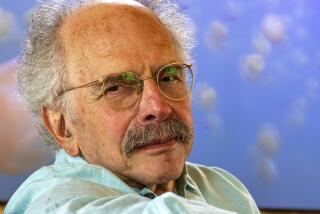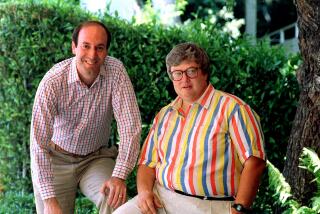When His Thumb Turned, Millions Got the Message
- Share via
Gene Siskel, dead at 53. Thumbs down to that script.
After his death Saturday, two of the TV obits I watched ended with the perfunctory: “He will be missed.” It was classic anchorese, what newscast androids always say when a celebrity dies, making you wonder if it’s spontaneous--what they think is expected of them--or a Ted Baxter read from a TelePrompTer.
Yet here I am saying it, too.
I will miss Siskel as a friend. Not literally. I barely knew him. A few phone chats, lunch with him and other members of a New York panel we were on together last year. That was it.
Instead, the closeness I felt for him was through television, the most intimate of media. “Siskel & Ebert” at 6:30 p.m., “60 Minutes” at 7. It’s been the Sunday routine at our house for years.
No wonder viewers often think of TV performers as their neighbors or extended family. No need to travel to movie theaters or anywhere else to see them. They visit you where you live, as if you trusted them enough to give them your house key.
Before there was TV, an adoring, wide-eyed Judy Garland wrote “Dear Mr. Gable,” saying he made her love him in a famous musical letter sent by a mortal to a handsome god. She would never be able to get close to him without him beaming down, because he occupied a universe seemingly a kadzillion miles away. In effect, it was that distant--and still is.
Although a newer heartthrob, George Clooney, may ride his recent career shift all the way to the feature film heavens, the multitudes may never feel quite as close to their hero as when pediatrician Douglas Ross dropped by Thursday nights as the “ER” orb shining brightest.
Reruns notwithstanding, he won’t be popping in like that anymore. Only friends do that.
I will miss Siskel as the friend who entered my home every Sunday night beside his partner, Roger Ebert, with whom he shared a TV platform that made them the most influential movie critics ever. And with whom he shared the fruits of a vast movie-reviewing franchise that made them more famous than most of the actors they critiqued, and made superstars of their thumbs. Their thumbs. Talk about marketing genius.
Part of their appeal was that neither had a natural affinity for television, and even after years of reviewing in front of the camera, both nationally and on competing local stations in Chicago, neither acquired a glib slickness or spoke in that peculiar foreign language known as blurbs. They didn’t have to. It’s always been a real hoot reading the made-for-quoting critics’ blurbs in movie ads (“I laughed so hard my hairpiece fell off”) knowing that the endorsement that counted most was the sparest, the “two thumbs up” or “way, way up” attributed to Siskel and Ebert.
No friendship is perfect. I’ve ranted at these guys for sometimes giving away too much plot and differed with them on specific movies, just as they differed with each other. And I’ve rued how their strong personalities at times eclipsed what they were reviewing, which is the “I” syndrome equivalent of a print critic writing about a movie entirely in the first person, just as I am personalizing this eulogy.
This coming together of messenger and message is endemic to TV, the most visual of media, and one that confers celebrity on whomever it touches.
Yet their personalizing of movies--without trivializing them--is what gave “Siskel & Ebert” much of its populist appeal and made the show the object of intense cloning both nationally and locally, from big urban centers to those shrinking blips on the U.S. landscape where neighborhood movie houses still survive.
Some years ago, I visited a station in tiny Glendive, Mont., then the smallest TV market in the nation. While I was there, two women were in a small, barren studio sitting opposite each other on folding chairs in front of a stationary camera, taping a show about what was playing at the local movie theater.
This was their “Siskel & Ebert,” they explained about one of the TV-bred common denominators connecting Americans with each other. In Glendive!
*
To say merely that “Siskel & Ebert” has been accessible to the mainstream is to sell the program short, however. Others wore that TV mantle first. But nowhere else on national TV have movies being regularly discussed with such intelligence and passion, in contrast to the quickie once-overs by morning show critics and stand-up monologues by local news bozos who regard movie reviews as their shot at being Leno or Letterman.
Siskel and Ebert, on the other hand, were never poseurs.
The show wasn’t quite the same after Siskel’s surgery last May for the brain tumor that would later take his life. That was because he wasn’t the same. He spoke slower, slurred his words at times and appeared more conciliatory in a format that was designed, in part, for genial combat. And his adversarial collaborator, Ebert, was too sporting, and smart, to press that advantage.
So it seemed to make sense when the announcement came earlier this month that Siskel was taking more time off to recuperate.
Rodgers found Hammerstein after Hart, so “Name to Be Filled In & Ebert” is not out of the question, either. But . . . I don’t know.
Ebert’s partner Sunday (on a show taped before Siskel’s death) was Tom Shales, the gifted Washington Post TV critic who also does movie reviews for National Public Radio. He’s scheduled to return for a second shot the week after this Sunday’s show when Ebert hosts a Siskel retrospective, a tribute that’s a fine idea.
Although a bit deferential at first, Shales was amusing, had some smart things to say (he didn’t win a Pulitzer Prize for nothing), and was spirited in contesting Ebert’s endorsement of the new movie “Tango,” calling it “too artsy-fartsy” for his taste, which Ebert appeared to take well, letting pass this opportunity for genuine conflict.
All in all, it wasn’t a bad show, considering the circumstances. The chemistry wasn’t the same, though. How could it be? Also absent was the aura of personal history, the “Siskel & Ebert” back story about two men whose careers intersected as critics on competing Chicago newspapers before they united on TV to ultimately become joined-at-the-hip superstars of the spoken word.
Other guest critics will follow, presumably, although none likely will re-create what Siskel and Ebert had together. It takes two to tango, after all.
More to Read
Only good movies
Get the Indie Focus newsletter, Mark Olsen's weekly guide to the world of cinema.
You may occasionally receive promotional content from the Los Angeles Times.










